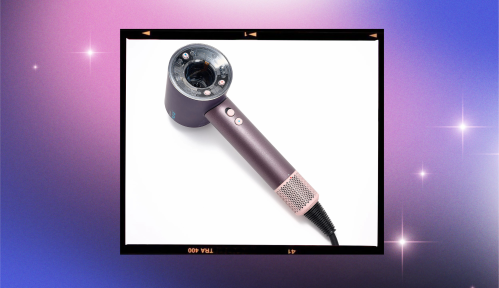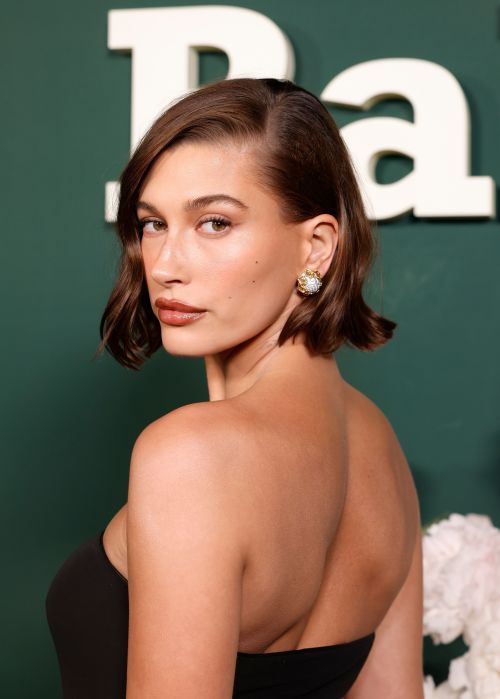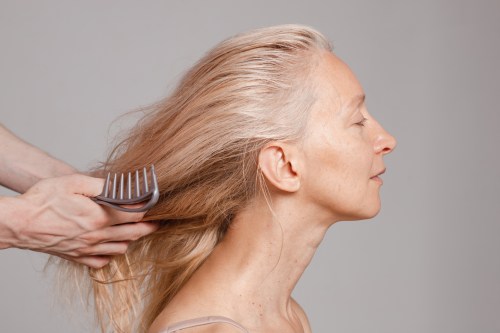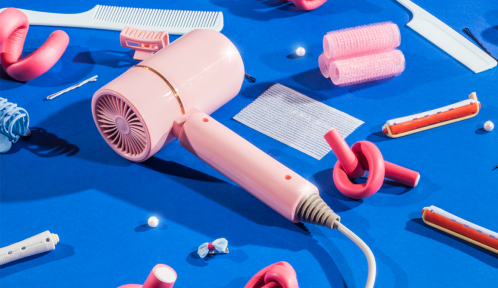Our editors independently select these products. Making a purchase through our links may earn Well+Good a commission
My Hair Started Falling Out in Chunks Because of the Pandemic—Here’s What I’m Doing About It
One unexpected effect of quarantine-related stress that’s affecting thousands of women: Pandemic hair loss.
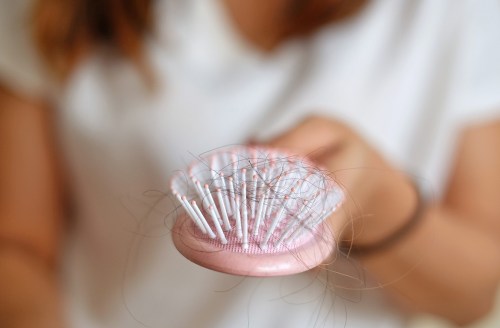
My hair has always been one of my “signature” features. It is long, thick, and full of body… or, at least, it was. Little did I know, pandemic hair loss was imminent. As time at home wore on, I started noticing that more and more strands ending up on my hairbrush, in the shower drain, and on my pillow. My natural Ariana Grande ponytail was becoming wispier and thinner by the day. Blow-drying my hair (something I used to complain about because it took such a long time) was cut in half. My part became more visible.
Experts in This Article
Linh Nguyen is a consultant, producer, and celebrity hairdresser and stylist.
Marie V Hayag, MD is a board-certified dermatologist based in New York City.
Sara Perkins, MD is a Connecticut based dermatologist.
And pretty soon, when I ran my fingers through my hair, chunks were coming out. I was devastated.

I am lucky (knock on wood) to have not contracted the coronavirus. But everything else related to the virus hit me hard; my business, livelihood, and lifestyle were essentially wiped out. I, like many people, tried to “pivot.” I am a naturally above-average stressed person: I am self-employed and run my own business. Publicly I am known as a food and lifestyle writer, but behind-the-scenes I run a private brand communications business, primarily working with food brands and restaurants—things impacted so much by the pandemic. On top of this biz change, quarantine life also brought in a monotony and malaise I’d otherwise never experienced, as I was accustomed to traveling internationally about once a month for the past several years and had a busy social life.
The more stressed I became trying to find work (and sense of self) again, the more my hair fell out. And the more my hair fell out, the more stressed I became. It was a vicious cycle. So, I started digging deep and finding natural solutions to regain my mane. Being an inquisitive and research-obsessed writer, I went down a deep Google rabbit hole, reaching out to a variety of doctors, hair stylists, and even acupuncturists on my hair journey.
Why is pandemic hair loss happening to everyone?
NYC-based and board certified dermatologist, Marie Hayag, MD, has been increasingly treating patients for hair loss as a result of stress caused by the pandemic. “Everyone has been so stressed since the start of COVID-19 and one of the most common things I’ve noticed is an increase in hair loss,” says Dr. Hayag. “Since stress pushes a large amount of hair follicles into the ‘resting’ phase called telogen effluvium, this delays new hair strands from being produced.”
The trigger causes the hair follicles, which normally cycle between growing, resting, and shedding phases, to all switch to the shedding phase. It typically begins two to three months following the trigger (I started seeing my hair abruptly fall out around April and May). Fortunately, the condition is temporary and typically self-resolves in three to six months, says Sara Perkins, MD, Dermatologist and Medical Advisor of Hims & Hers. (Thank all the gods.)
Although telogen effluvium rarely results in “balding,” as I learned from various doctors, it *can* result in losing as much as 50 percent of the hair. And that’s what happened to me. I was shedding like crazy.
Dr. Perkins shared with me that common causes of telogen effluvium include major illness, psychological stress, surgeries, extreme weight loss or malnutrition, and abrupt hormonal changes.
The trigger causes the hair follicles, which normally cycle between growing, resting, and shedding phases, to all switch to the shedding phase.
Like perhaps a lot of other folks, I was not eating my best during quarantine. In fact, I wasn’t eating very much at all. When people get stressed out, some eat more than usual. I am the opposite: I lose my appetite. I subsisted off of coffee and cereal and whatever happened to be hanging out in my fridge. I had a consultation with Melissa Anzelone, ND, from Nutrafol and she shared with me that skipping meals and low protein intake/high carb intake was actually doing my hair absolutely no favors—in fact, it was making my hair loss worse.
I upped my nutrition and started supplements
“Not hitting the minimum of protein a day, skipping breakfast, or just eating [all] vegetables contributes to hair loss,” says Dr. Anzelone. “When you skip meals it causes stress to the body and it increases the stress hormone cortisol, which can interrupt the hair growth cycle.”
Oops. I purchased some protein-packed collagen powder the second we got off the phone. I’m checking out Inner Strength Honu Marine Collagen ($30). Eating tons of animal or plant-based protein is not so appealing to me as it makes me feel overly full and lethargic, so a collagen or protein powder works well for me.
I also armed myself with a variety of supplements. I am giving the much buzzed about brand Nutrafol ($79), a go. Considering my tightened finances, I’ve also got the more wallet-friendly Hush Hush Deeply Rooted ($56 monthly) and Objective Wellness’ Healthy Hair ($28) ready if my situation becomes more dire. Since I was working out at home for free, my justification for the supplements is easier to swallow (haha) as I was no longer paying for a $100+ monthly for a gym membership.
By the way, if you start taking hair growth supplements, you will not grow hair all over your body. Oh yes, I definitely asked: The receptors on the scalp are different from other parts of the body, according to Dr. Anzelone. Hair on the body responds to high levels of hormones aka only puberty and old age, whereas scalp hair responds to everything.
By the way, if you start taking hair growth supplements, you will not grow hair all over your body.
Reducing stress (my main transgressor) was supposed to be my first hair loss problem to tackle. How do you reduce stress when the primary cause of stress—a pandemic, job loss, and devastated economy—is so out of your control? Not one to back down from any challenge, I upped my intake of CBD from sporadically to daily. (There are a ton of CBD products out there.) Nutrafol also has stress reducing adaptogens like ashwagandha, so that helps ease any anxiety about the price point, and if I do decide to simplify my supplements or oral action plan, it’s covering a lot of bases.
I got the right hair supplies
So what am I putting on my head? I got really into it, going so far as to reaching out to Alyssa Milano’s hair stylist, Linh Nguyen, for advice. If you haven’t seen Milano’s viral hair loss video, check it out. It truly made me feel like I wasn’t alone in this hair loss chaos.
He recommended the following treatment regimen for Milano when she was experiencing significant hair loss as a side effect of COVID-19: NIOXIN System Kit #6, NIOXIN Recharging Complex Hair Growth Supplements, NIOXIN Night Density Rescue, and NIOXIN Minoxidil for Women 2%.
“Since Alyssa was experiencing significant hair loss I recommended she use Minoxidil,” says Nguyen. “Of note, this treatment is specifically for hair re-growth and only those with excessive hair loss should consider using. I recommend speaking with a dermatologist before using to ensure this treatment is right for you.”
In addition to Nguyen’s recommended products, he shared a few tips for dealing with hair thinning or loss such as using a silk pillowcase (this will be less abrasive on hair/leads to less breakage), gentle brushing with boar bristles on dry hair or The Wet Brush ($12) and scrunchies and cloth headbands.
After much research, I am going with KeraHealth shampoo and conditioner for hair loss (for now) since it is drug-free and supposedly stimulates growth at the cellular level along with Vitabrid C12 called HAIR Tonic Professional. But I definitely snagged myself a silk pillowcase by Grace Eleyae and have been practicing all of his tips which don’t break the bank either.
There are some really pricey treatments out there for hair loss like PRP (process in which your blood is drawn and then placed in a centrifuge to separate out the plasma then injected into the scalp to stimulate hair follicles) or laser light therapy, but those are upwards of $2,000 and I don’t have the type of budget to support these.
The only slightly more expensive thing I am trying out is acupuncture, which I am a firm believer in for stress reduction, but unfortunately have not been able to do since the pandemic began due to government-mandated closures. But apparently, there is acupuncture that aids hair loss at the Yinova Center in New York City that I have myself booked for since the center opened. It’s not covered under my insurance (although it may be depending on your plan!) but I’m not dining out and traveling as I used to, so this is my “I deserve this” moment.
Is it going to work?
“When will I get my mane back?” I asked all the docs. Expect five to six months, they all pretty much told me. But I’ve already started seeing some signs of hope: A friend of mine recently commented that I was shedding less than before (yes, I shed that much before that friends would notice). When I am in the shower, there is a lot less hair that I am pulling out of the drain and my brush during once a week blow dries. Chunks don’t come out in my hands when I run my fingers through my hair. And I am on the rebound as it comes to my professional work with new clients.
It will take time to regain my density and thickness, but focusing on what I can control—including sleep, diet, and acceptance of what is out of my control—is a start.
Oh hi! You look like someone who loves free workouts, discounts for cult-fave wellness brands, and exclusive Well+Good content. Sign up for Well+, our online community of wellness insiders, and unlock your rewards instantly.
Sign Up for Our Daily Newsletter
Get all the latest in wellness, trends, food, fitness, beauty, and more delivered right to your inbox.
Got it, you've been added to our email list.
